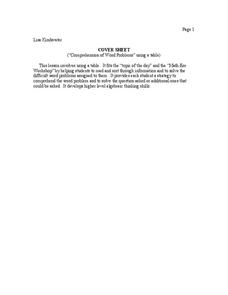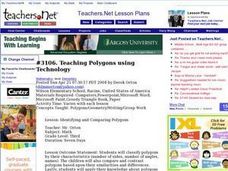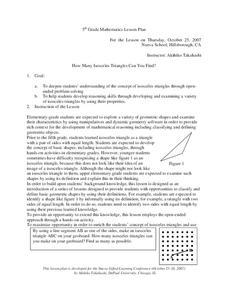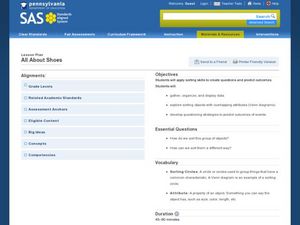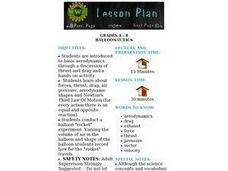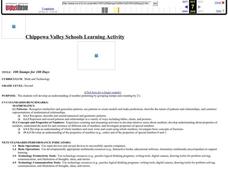Cornell University
Non-Newtonian Fluids—How Slow Can You Go?
Children enjoy playing with silly putty, but it provides more than just fun. Young scientists make their own silly putty using different recipes. After a bit of fun, they test and graph the viscosity of each.
Curated OER
Counting By 5s
Second graders count by 5's to 100. In this math lesson conducted on the 100th day of school, 2nd graders use picture stamps in the KidPix program to count by 5's and get to 100.
Curated OER
Working with larger arrays
Fifth graders use arrays to show the meaning of multipication in selected situations. They practice using large and small arrays. The lesson has numerous activities, which gives students more opportunities to display academic growth.
Curated OER
"Comprehension of Word Problems" Using a Table
Sixth graders practice solving math problems by utilizing a data table. In this number sense lesson, 6th graders create a table using the numerical information about a fictitious farm's inventory. Students complete the empty segments by...
Curated OER
Space Circles
Fifth graders calculate the diameters and radius of planets as a book is read to them. In this diameter and radius lesson plan, 5th graders read the book Space Circles and calculate the measurements based on the information in this book.
Curated OER
Teaching Polygons using Technology
Third graders utilize different types of computer programs, such as Microsoft paint and Microsoft Word to study and create different types of polygons. They use PowerPoint to create a story about a shape and others that it meets during a...
Curated OER
Junk Sort
Students analyze objects by one or more attributes. For this sorting lesson, students use manipulatives and string or yarn to create a sorting game. Students read books and items from the classroom to sort.
Curated OER
How many isosceles Triangles Can You Find?
Fifth graders solve problems while examining a variety of isosceles triangles. For this isosceles triangle lesson, 5th graders examine shapes to find their characteristics. Students pay particular attention to the...
Curated OER
How many isosceles triangles can you find?
Seventh graders recognize the characteristics of isosceles triangles. In this isosceles triangle lesson, 7th graders use geoboards to create isosceles triangles. Students record results and explain why they have an isosceles triangle.
Curated OER
Preparation and Transition to Two-Column Proofs
Young scholars investigate proofs used to solve geometric problems. In this geometry lesson, students read about the history behind early geometry and learn how to write proofs correctly using two columns. The define terminology valuable...
Curated OER
Be a Structural Engineer!
Students investigate how to design and build items with a focus on structural strength as an engineer would. They complete a truss-building project as a final assessment.
Curated OER
One Good Turn Deserves Another
Students make observations about shapes and 1-, 2-, and 3-dimensional objects. They conduct observations and make predictions regarding transformations of simple geometric shapes. They identify shapes that occur in household items.
Curated OER
2.0 "Water Is Life" Global Water Awareness Mini-Unit (Grades3-5)
Students study the amount of potable water on the Earth. For this water lesson, students examine the amount of potable water as compared to all the water on the Earth. They discuss why many parts of the world do not have access to good...
Curated OER
Geoboard Squares
Students create squares of different sizes on a geoboard. They find and describe a pattern. Students use the pattern to determine the number of squares possible on a 10-by-10 geoboard. They create squares with a horizontal base (and...
Curated OER
Rep Tiles
Third graders use pattern blocks of one shape at a time to try to create a similar shape. They compare the perimeter of the new figure with the perimeter of the original shape and look for a pattern. Students use the pattern to predict...
Curated OER
DOWNHILL DISCOVERIES
Students studykinetic energy, friction, drag and acceleration by relating it to the Winter Olympics. In this physical properties lesson students create tracks and determine how the course conditions affect bobsled, luge and...
Curated OER
Sound--Music or Noise?
Young scholars are introduced to the concept of sound and how it is presented in the world around them. Using scientific terms, they describe the properties of sound and create their own definitions of sound, music, and noise. They...
Curated OER
Introduction to Fractions
Fourth graders break into groups having 10 come to the front and figure out the fraction of students are wearing jeans, glasses, have brown hair, etc. They write the fraction together. Each student then makes a picture and be able to...
Curated OER
All About Shoes
Students sort shoes. In this sorting lesson plan, students use shoes to explore attributes and practice sorting. This lesson plan encourages the use of a Venn Diagram to aide in student sorting.
Curated OER
Balloonautics
Students are introduced to basic aerodynamics through a discussion of thrust and drag and a hands-on activity. They examine the forces of thrust, drag, air pressure, aerodynamic shapes and Newton's Third Law Of Motion.
Curated OER
Symme"tree"
Students practice drawing lines of symmetry after the teacher draws shapes on the board. They create a class symme"tree" using only symmetrical shapes to decorate it.
Curated OER
100 Stamps for 100 Days
Second graders count by 2's to get to 100. In this counting lesson plan, 2nd graders use the program Kid Pix to create stamps two at a time until they get to 100.
Curated OER
Sum of the Parts
Fifth graders build objects using various materials. They estimate the weight of the object using individual building pieces. Then they weigh the actual object and then tear it apart and weigh the pieces. They compare the two weights.
Curated OER
Reflections
Fifth graders create a reflection of a poygon using a Mira. They discover that a line connecting a vertiex of a polygon and the corresponding vertex of its reflection is perpendicular to the line of reflection. Students create a glide...





